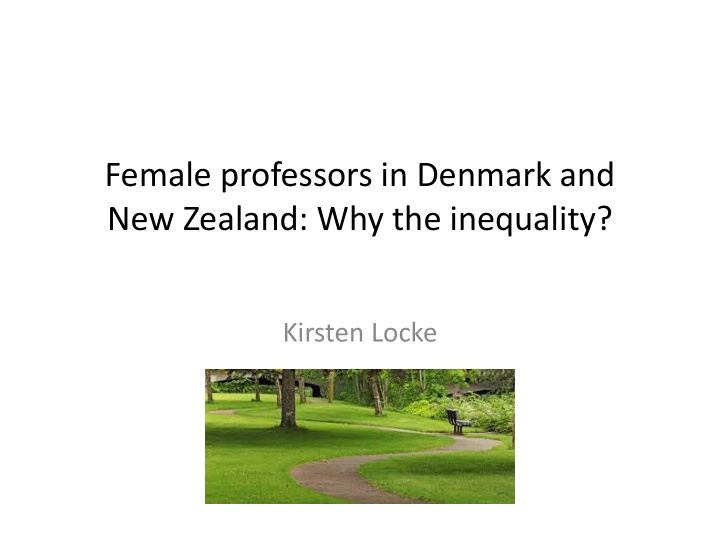



Female professors in Denmark and New Zealand: Why the inequality? Kirsten Locke
Gender and Management in the University • University Reform, Globalization and Europeanization (URGE) • Comparative gender project between Denmark and New Zealand • Co ‐ Researcher: Professor Susan Wright, Aarhus University
Reason for the research: Female professors in Denmark and New Zealand 90.00% 80.00% 70.00% 60.00% 50.00% Male Professors 40.00% Female Professors 30.00% 20.00% 10.00% 0.00% NZ DK New Zealand Female Professors: 22.6% Danish Female Professors: 18.4% Ståhle 2013http://ufm.dk/forskning ‐ og ‐ innovation/statistik ‐ og ‐ analyser/forskere ‐ ved ‐ universiteterne/videnskabeligt ‐ personale ‐ pa ‐ universiteterne ‐ 2013 ‐ statistiknotat ‐ 1.pdf
Intersectionality • Methodological ‘lens’ • complex ways different sociocultural categories intersect and mutually construct each other ‘Doing’ Academic Requires at least two competencies: 1. Research capabilities (formal) – publications, grants, measurable outputs 2. A range of cultural and social capabilities (informal) Competences in ‘doing academic’ in this practical ‐ social sense are not exposed to formal assessment
Leadership, age, ‘femininity’ About older women: KL: How many female Deans are there around here? Response: Well the one before the one we have now used to be female here and she was incredibly unpopular. … But then the Dean of [another department} is a woman, but she’s one of those woman about which people say, that you know, she’s not really a woman anymore… … She doesn't look like and she doesn’t behave Locke, K. (In press). Muse or master? Erotic capital in the academy. In Wright, S, Shore, C, & Robertson, S. (Eds) Death of the Public University? Uncertain Futures for Higher Education in the Knowledge Economy, Oxford, UK: Berghahn.
Heteronormative lens: Private vs Public I don’t think I want to answer that … But I can tell you why, and that is because it’s such a traditional way of looking upon other people. Did you see, no of course you didn’t, every time there’s a mention of people who have done something in the newspaper, you will get in the story, ‘Oh they’re married to that person, they’ve got two children, one boy, one girl, blah, blah, blah, blah’. The whole heteronormative matrix is being pulled out all the time on women to explain them. And I don’t really recognize that kind of explanation … I don’t want to be explained in terms of the heterosexual matrix … I don’t want to be understood within those premises’. Locke, K. (2015). Intersectionality and reflexivity in gender research: disruptions, tracing lines and shooting arrows. International Studies in Sociology of Education , 1 ‐ 14. doi:10.1080/09620214.2015.1058722
Naturalised/Invisibilised ‘emotional labour’ “But sometimes it’s like okay, you know what guys, I’m now working my ass off to make this a good department to be in, so give me a little credit for that. And my [colleague] always says you won’t get that credit. The funny thing is, I’ve had a lot of credit now, but I think it’s running out now because … they start thinking that I know that I’m good at what I do so they don’t need to tell me…” Locke, K., & Wright, S. (forthcoming). Mainlining the motherboard: The paradox of gendered academic labour. In Ronnblom, Hudson, C., & Tehghtsoonian, K. (Eds), Missing in Action? Gender, Governance and Power ’. London, UK.
Ambition, gender, feminine You know [my older male colleague]. He was there after our big opening, which was really a success, he came to me and he was there and he didn’t say anything until at the very end he said, so aren’t you afraid of having become too ambitious? Nothing about what a nice opening.
Key Findings (NZ & DK context) Concrete 1. Anonymous funding applications and obligation to report gender statistics 2. Data – NZ stopped Census for Women’s Participation reporting • Age, discipline, position, ethnicity, disciplinary ‘core’ Culture Shifts 3. Gender equity a ‘done deal’: Resist arguments that gender battle has been won 4. Acknowledge heterogeneity of the category ‘woman’ – generational, ethnic, sexual
Where to from here? • FRDF to embark on NZ phase • Interview senior academic women in 8 NZ universities March – June 2016 • Visiting scholar at Aarhus in June to write up book proposal
Recommend
More recommend